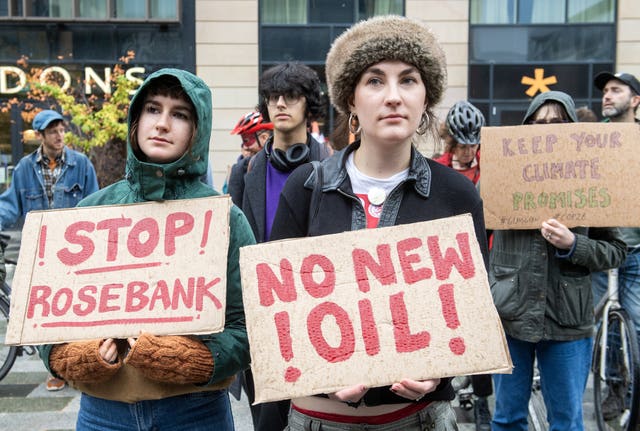
Oil from new licences granted to North Sea producers and sent to UK refineries would account for less than 1% of the fuels used here in 2030, analysis has found.
The Energy and Climate Intelligence Unit (ECIU) said new projects like Rosebank would therefore make little difference to the UK’s energy independence and security – one of the Government’s key arguments for supporting further production.
It has also said North Sea oil and gas would reduce the UK’s reliance on imports and therefore reduce the emissions involved in shipping.
In answer to a written parliamentary question, the Government accepted that around 80% of the oil produced in the UK is refined overseas into products that are then shipped back over.
It also said “It is not desirable to force private companies to ‘allocate’ oil and gas produced in the North Sea for domestic use”, appearing to admit that much of the oil produced by Rosebank and other projects would be sold abroad.
 The Government’s plans have brought protests from environmental campaigners (PA)
The Government’s plans have brought protests from environmental campaigners (PA)
The Government is also trying to pass legislation, due in the Commons on Monday, that would require the North Sea regulator to invite applications for new oil and gas licences on an annual basis instead of the five-year average currently in place.
Critics have accused the Government of backing new production as a way to create a dividing line with Labour as a general election approaches.
READ MORE: Tory MP quits in protest over more North Sea oil and gas drilling
Professor Gavin Bridge, fellow of the Durham Energy Institute at Durham University, said: “The reality is very little of the oil pumped from the North Sea is refined and sold on British soil, and even then the price is largely dictated by international markets.
“The notion that more drilling on the continental shelf boosts our energy security doesn’t stand up to scrutiny.
“Most of the oil is extracted by private or foreign state-owned companies over which the Government has little control.”
For their analysis, the ECIU looked at oil from UK fields produced in UK refineries and at products made in those refineries like diesel, petrol and aviation fuel.

They found that very little oil used in the UK is produced and refined here – just 13% in 2022.
As the amount of available fuel in the North Sea declines and demand falls, this will reduce to 1% by 2030.
Dr Simon Cran-McGreehin, head of analysis at ECIU, said: “New licences are a distraction from policies that would have a real, lasting impact on the UK’s energy independence.
“Oil from new fields such as Rosebank will be traded internationally – as the Government has admitted. This oil is not earmarked for the UK and it won’t make any real difference to UK prices.”
READ MORE: North Sea oil and gas chief post quits with immediate effect
A Department for Energy Security and Net Zero spokesperson said: “With energy markets becoming more unstable, it makes sense to make the most of our own homegrown advantages in the North Sea.
“That’s why we’re backing the UK’s oil and gas industry with annual licences, supporting 200,000 jobs and giving them certainty to invest in jobs here and unlock billions in tax for our own transition to clean energy.
“As a net importer of oil and gas, the UK increasingly produces less oil and gas than it uses. These new licences will not make us a net exporter or increase carbon emissions above our legally binding carbon budgets.”



Why are you making commenting on The Herald only available to subscribers?
It should have been a safe space for informed debate, somewhere for readers to discuss issues around the biggest stories of the day, but all too often the below the line comments on most websites have become bogged down by off-topic discussions and abuse.
heraldscotland.com is tackling this problem by allowing only subscribers to comment.
We are doing this to improve the experience for our loyal readers and we believe it will reduce the ability of trolls and troublemakers, who occasionally find their way onto our site, to abuse our journalists and readers. We also hope it will help the comments section fulfil its promise as a part of Scotland's conversation with itself.
We are lucky at The Herald. We are read by an informed, educated readership who can add their knowledge and insights to our stories.
That is invaluable.
We are making the subscriber-only change to support our valued readers, who tell us they don't want the site cluttered up with irrelevant comments, untruths and abuse.
In the past, the journalist’s job was to collect and distribute information to the audience. Technology means that readers can shape a discussion. We look forward to hearing from you on heraldscotland.com
Comments & Moderation
Readers’ comments: You are personally liable for the content of any comments you upload to this website, so please act responsibly. We do not pre-moderate or monitor readers’ comments appearing on our websites, but we do post-moderate in response to complaints we receive or otherwise when a potential problem comes to our attention. You can make a complaint by using the ‘report this post’ link . We may then apply our discretion under the user terms to amend or delete comments.
Post moderation is undertaken full-time 9am-6pm on weekdays, and on a part-time basis outwith those hours.
Read the rules hereLast Updated:
Report this comment Cancel